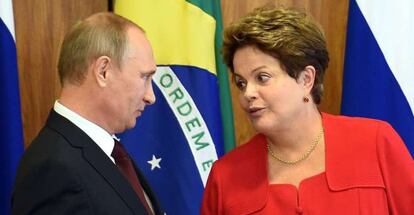Russia to sell Brazil anti-aircraft system
Putin and Rousseff reach deals on infrastructure, education, health, tech and culture


Russian President Vladimir Putin met with Brazil’s Dilma Rousseff on Sunday at the Maracanã stadium in Rio de Janeiro, where the Brazilian leader handed the World Cup to the German team and passed the baton over to Russia, which will host the sports event in 2018.
But their next meeting was held in rather different circumstances. On Monday, Putin and Rousseff shut themselves away for two hours to discuss bilateral relations, and the result was a series of agreements on infrastructure, health, technology, air and space, education and culture, according to the Brazilian executive’s press release.
Yet the most salient aspect of the deal involves defense. Russia and Brazil, which are both part of the BRICS bloc (which also includes China, India and South Africa), have been haggling for years over the sale of a Russian anti-aircraft defense system for Brazil’s armed forces. The document that was signed on Monday establishes that Brazilian representatives will participate in maneuvers to demonstrate the effectiveness of the defense system next month. The deal stipulates that the sale could be completed “in the short term,” without any further details.
Russia and Brazil hope to double their trade volume, which now stands at 5.6 billion dollars
Russia and Brazil hope to double their trade volume, which now stands at $5.6 billion (€4.1 billion). Both Rousseff and Putin have expressed a desire to take this up to $10 billion.
After walking out of the meeting, Rousseff insisted that Russian investors view the Latin American giant as a great opportunity in emerging sectors such as energy. Both nations will cooperate in exploring, exploiting, storing and transporting oil and gas reserves in Brazil.
The Brazilian stop is part of a Latin American tour that has already taken Putin to Cuba, Nicaragua and Argentina to strengthen ties. Putin and Rousseff will also take part in a BRICS summit in Fortaleza, in northeastern Brazil, to try to create an alternative to the International Monetary Fund that will help finance their own infrastructure projects and maintain reserves for any future financial crises.
This is not the best moment for either Putin, who is dealing with the crisis in Ukraine, or for Rousseff, who admits that the economy has slowed down and who faces the possibility of losing the general elections in October.
Tu suscripción se está usando en otro dispositivo
¿Quieres añadir otro usuario a tu suscripción?
Si continúas leyendo en este dispositivo, no se podrá leer en el otro.
FlechaTu suscripción se está usando en otro dispositivo y solo puedes acceder a EL PAÍS desde un dispositivo a la vez.
Si quieres compartir tu cuenta, cambia tu suscripción a la modalidad Premium, así podrás añadir otro usuario. Cada uno accederá con su propia cuenta de email, lo que os permitirá personalizar vuestra experiencia en EL PAÍS.
¿Tienes una suscripción de empresa? Accede aquí para contratar más cuentas.
En el caso de no saber quién está usando tu cuenta, te recomendamos cambiar tu contraseña aquí.
Si decides continuar compartiendo tu cuenta, este mensaje se mostrará en tu dispositivo y en el de la otra persona que está usando tu cuenta de forma indefinida, afectando a tu experiencia de lectura. Puedes consultar aquí los términos y condiciones de la suscripción digital.








































